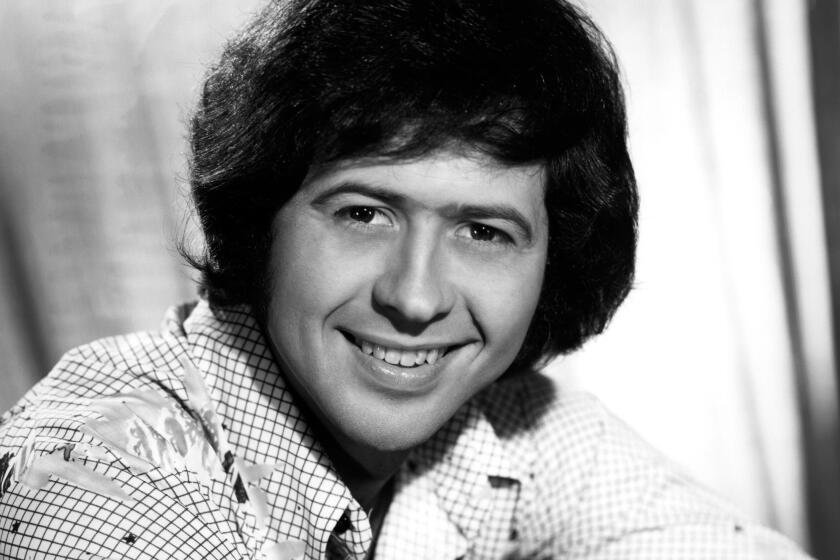Pinning Prejudice on Shakespeare : SHYLOCK: A Legend and Its Legacy: <i> By John Gross (Simon & Schuster: $25; 369 pp.)</i>
There are only a handful of fictional characters who have managed to cut themselves loose from their original moorings and assume an independent existence in the literal, as opposed to the literary, world. Sherlock Holmes and Don Juan spring to mind, as do Simon Legree and Polyanna. In the theater, Romeo and Hamlet have come to embody universal types, and so has Lothario, a relatively minor character in an obscure drama by Nicholas Rowe.
But of all these, Shylock has possibly carved out the largest niche. Over these 417 years, he has come to typify a certain kind of Jew (grasping and heartless for some, victimized and cruelly put-upon for others) with whom we must come to terms; never more so than since the Holocaust. In Shakespeare’s time (and due mainly to Marlowe’s fiendish depiction of Barabas in “The Jew of Malta”), the stage-Jew was a garish caricature; a usurer, an exploiter, a heathen. Shylock, despite his stereotypical ginger-wig and stuck-on Hebraic nose, was the first humanized Jew on the English stage. Cruel, materialistic, vindictive, covetous, still there was an unmistakable trace of sympathy about him; and over the centuries, from Henry Irving to Jacob Adler, from Laurence Olivier to Dustin Hoffman, he has gradually shed his craven and vicious persona and become, in some instances, dignified, almost grand.
The Shylock paradox, (how can a harsh caricature become a sympathetic human being?) is the subject of John Gross’ thoroughly engaging book, “Shylock: A Legend and Its Legacy.” Gross not only fills us in on all the standard critical theories about the character but follows each ramification to its logical frontier. Thus we get the history of the anti-Semitism inspired by the character, the psychoanalytic view, Shylock as embodiment of the entrepreneurial spirit, the offshoots and spinoffs of the moneylender in fiction and poetry as well as a comprehensive stage-history which, the author being a practiced drama-critic, is told in an effortless weave of lucid imagery.
When, however, Gross follows the thread of the character into literature and films, we feel his thesis beginning to tug at the seams. There is a legitimate overflow from Shakespeare’s play into adaptations and sequels, but to forage into Proust and Marx, Ernst Lubitch and James Joyce seems to me to be constructing a house of mirrors in which every glass reflects back the author’s obsession. The quality of mercy may not be strained, but one’s patience with circumlocutions is.
Given Gross’s predilection to rescue Shylock from the ignominy of his harshest critics, there is a curious omission in his research. He doesn’t mention the point that, folklore, drama and legend apart, the only factual account of the “pound of flesh” was written by Gregorio Leti, a Catholic historian, in his “Biography of Pope Sixtus V” and in this report it was a Christian merchant who threatens a Jewish moneylender “with cutting a pound of flesh from whatever part of the Jew’s body he pleased.” But by the end of the 16th Century, the image of the diabolical usurer, the consumer of babies and poisoner of wells was too deeply entrenched to be affected by facts.
Over the years, the character of Shylock has become inextricable from “the Jewish question” which, in my view, puts an unfair onus on the play. Approving of “The Merchant of Venice” has become tantamount to being guilty of anti-Semitism--which is as irrational as saying that any black who enjoys “Othello” must be an Uncle Tom since the black General was in the hire of a white Establishment doing battle against brown-skinned Turks. Although Gross tries hard to restore some equilibrium to the discussion, even he is guilty of using Shylock as a weapon in the racist controversy that surrounds the play alleging that, in some way, it laid the groundwork for the Holocaust. It seems to me once one has accepted the historical basis for the stereotype, the play offers a great challenge to directors to turn it around. One of Shakespeare’s greatest virtues is that you never know where he stands on any of the issues he dramatizes, and in the case of “The Merchant,” there is almost as much evil in the defending Christians as there is in the prosecuting Jew, and a verdict that relieves a moneylender of half his wealth and then forces him to convert to save his skin is not really a sterling example of Christian justice. The reason Shylock tends to win so much sympathy from audiences is that they smart at the injustice of a civil action that turns unexpectedly into a prosecution of the petitioner. This does not remove the prejudice from the play but it goes some way toward redressing the moral balance.
Gross is unimpressed by Jonathan Miller’s “incoherent” Victorian rendering in which “the whole theme of assimilation and rejection was something which the production tried to graft on to the play from the outside;” by the Bill Alexander-Anthony Sher version which “was supposed to ruffle the complacency of liberal audiences by stirring up their buried prejudice;” by virtually every interpretation he has seen. He seems to be constantly on the look-out for the “true play” without realizing that all any production can do is provide a partial insight; one part of the constantly changing jigsaw-puzzle, which is the play-proper. Looking for the definitive “Merchant of Venice” is like writing the definitive book about “Shylock.”
Throughout all these fascinating accounts of other critics and scholars, we long to hear the author’s own opinions on the subject and finally, in the last six pages, Gross climbs out from behind his sources and speaks in his own voice. Shakespeare, he says, “though he may have started out with stereotypes, seldom ended up with them. . . . It was a greater step for him to have created Shylock in the 16th Century than for George Eliot to have written ‘Daniel Deronda’ in the 19th Century. The seeds of sympathy are there. Actors who have portrayed a tragic or sorely misused Shylock may have often gone too far, but it is Shakespeare himself who gave him their opening.”
Not a revolutionary conclusion, as Gross himself concedes, but by then one is breathless from the robust canter one has had from the 16th to the 20th Century and panting from both the richness of the landscape and the distance traveled. The greatest compliment I can pay the book is to confess that when I finished it, I felt I never wanted to read another word about Shylock again.
More to Read
The biggest entertainment stories
Get our big stories about Hollywood, film, television, music, arts, culture and more right in your inbox as soon as they publish.
You may occasionally receive promotional content from the Los Angeles Times.










